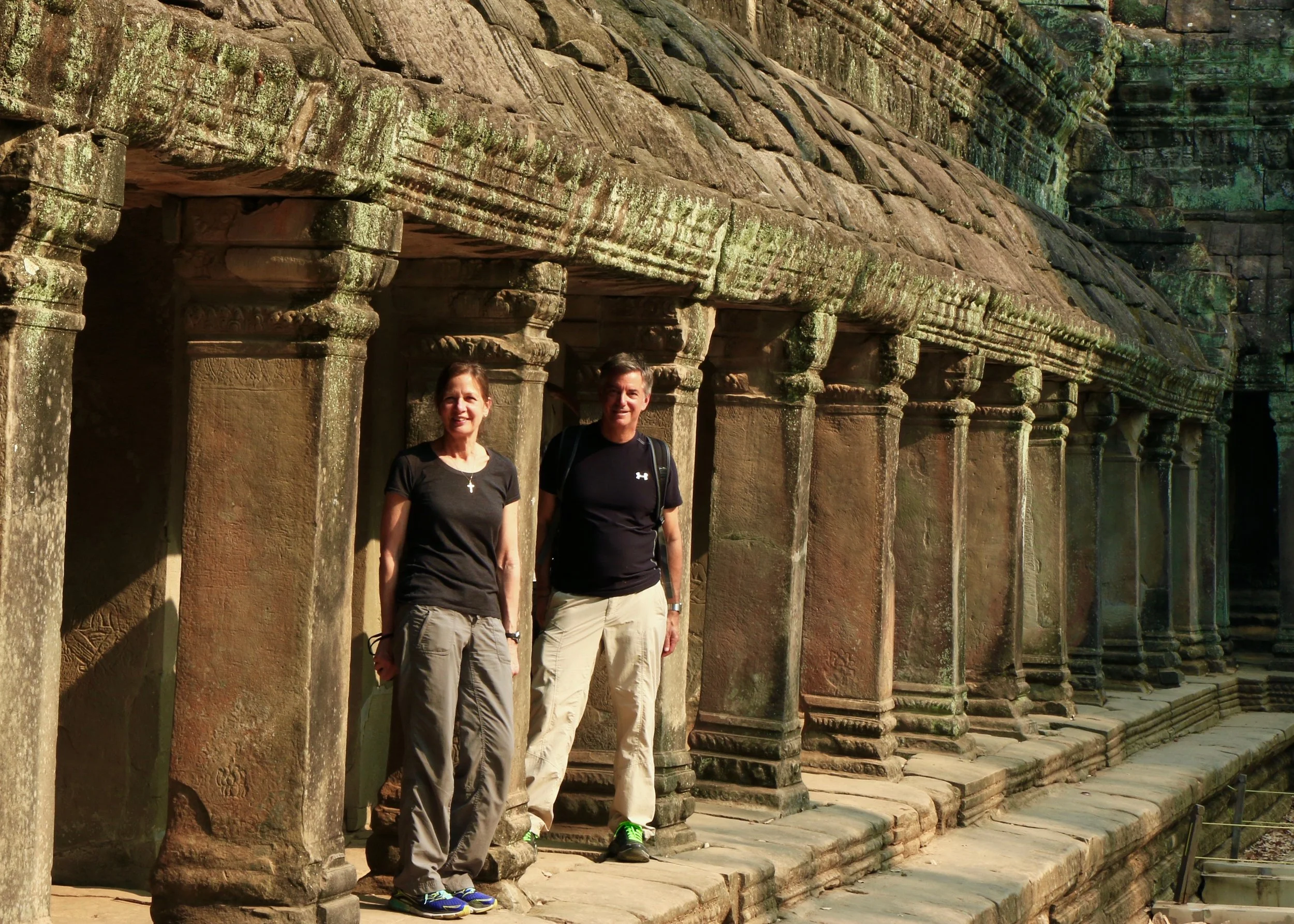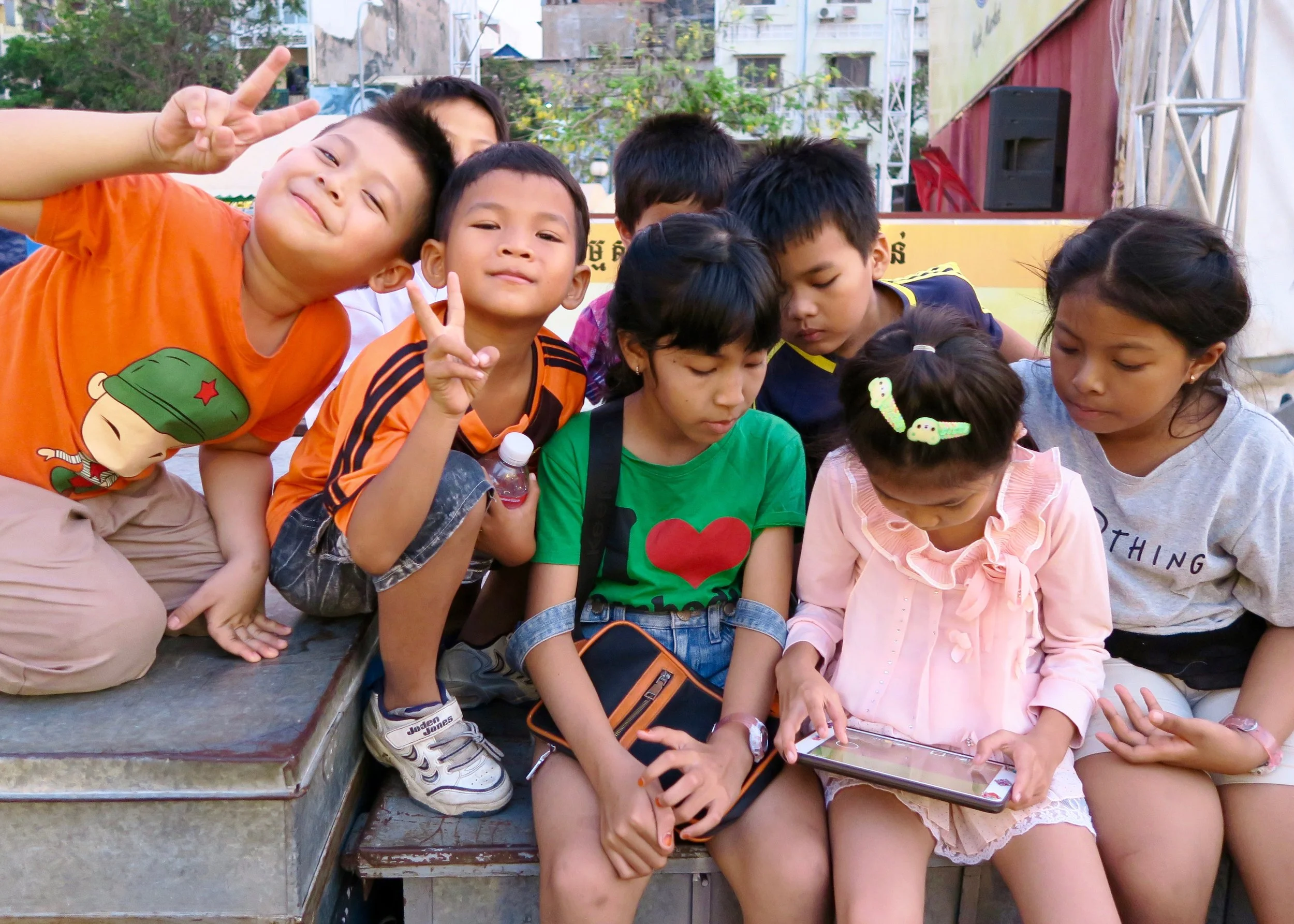Siem Reap, Cambodia 2016
Following our visit to Phnom Penh, we traveled north to Siem Reap. The name "Siem Reap" translated means "Defeat of Siam". This reflects the many wars and conflicts between the tribes, kingdoms and countries within the region. Our visit to Siem Reap focused on the Angkor archeological site, visiting 10 of the key Wats (Buddhist Temples) and spending time in several villages to visit the local people in their homes.
The Angkor site covers approximately 250 square miles, with many temples, urban city plans, reservoirs, canals, and villages. For several centuries Angkor was the center of the Khmer Kingdom and was one of the most powerful civilizations in the world from the 9th to 15th century (and included much more geography - portions of Vietnam, Laos, Thailand, Burma, China). We had excellent guides which helped us understand the history, the remains of the site, and many of the cultural behaviors. The temples (Wats) we visited included: Angkor Wat, Banteay Srei, Taprom, Takeo, Tanei, Preahphalilay, Phimeanakas, Baphwon, Banyon and Beng Mealea. Each of the Wats expressed their unique symbolic religious, political or societal significance through their layout and artistic works. Their presence was even more exceptional due to their location within the overgrown tropical trees and forests!
As we visited the temples, villages and local people, we were frequently struck by how intertwined the buddhist religious beliefs were displayed in their daily life. Their commitment to Buddha and "friendliness to all" was common throughout the area. There are no homeless or beggars because families, monasteries and/or communities try to provide adequate food and shelter to all. Which is amazing, as Cambodia is one of the poorest countries in the world.
Each and every day we were overwhelmed with so much history, culture and Cambodia's amazing structures! Here are a few additional insights you may find interesting:
90% Buddhist - Monks are closely woven into the local community. They do not cook, as the community provides food and financial support. An early morning procession of the monks walk through the village/city and are given rice, fruit, etc by the community. Then, for lunch, which is their last meal of the day, the food is brought to the Monks by the villagers.
Stilt homes are typical in villages. It helps avoid flood damage, and keeps the bugs and snakes out. Because it is cooler under the house during the heat of the day, they "live and cook" under the home but they sleep above in the evening.
Match making is still common and dowries are important. Prices can be negotiated.
Typically families in the villages live without plumbing and electricity. However, a local "battery man" charges car-like batteries to provide power within their homes.
Schools are recovering from the Khmer Rouge's elimination of education. School is now available but many children in the villages do not attend and if they do, classes are only 4 hours per day.
Corruption, bribery and nepotism is present and practiced in most parts of the country... especially in the Government.
Full Meal Food Prices: Street Cart Food $1, Basic restaurant $2 and high end tourist meal $5.

Banyon Wat

Banyon Wat

Banyon Wat

Banyon Wat

Banteay Srei Wat

Banteay Srei Wat

Banteay Srei Wat

Banteay Srei Wat

Taprom Wat

Taprom Wat

Taprom Wat

Taprom Wat

Takeo Wat - Included during early morning Bike ride

Takeo Wat

Tanei Wat

Tanei Wat

Tanei Wat

Baphwon Wat

Angkor Wat

Angkor Wat

Angkor Wat

Angkor Wat

Angkor Wat - Originally Hindu, but was converted to Buddhist

Angkor Wat

Angkor Wat

Angkor Wat

Angkor Wat

Beng Mealea Wat

Beng Mealea Wat

Primary School - "Eat, eat you will be fat - Read read you will be smart"!

School - The "Smart Ones"

Stilted house in Village

Village Rush hour

Super friendly

Kids are happy with simple toys

Our turn - once is enough!

Gate Bridge over Moat/River

Moat

Breakfast at a Village Market

Fish and Frog on a Stick. We tried Frog!

Bag O' Bugs

Meat Section at the Market

Noodle factory at home

3 Generations typically live in each home - This home includes a rice winery



